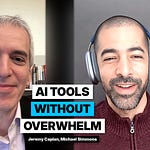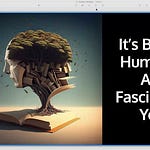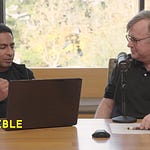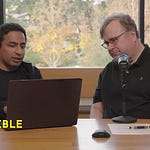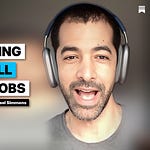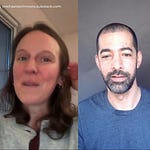In this transformative session, I explored one of the most profound questions of our time: What if the limits we accept about human potential are simply outdated beliefs waiting to be transcended?
Drawing from breakthrough examples like Roger Bannister's 4-minute mile and Danny Way's impossible skateboard jump over the Great Wall of China, we examined how perceived impossibilities become routine once someone proves they can be done. The session revealed how AI can serve as our thinking partner in questioning assumptions about what we can achieve, learn, and become.
What We Covered
During the class, we:
Explored John Lilly's radical perspective on transcending mental limits
Examined parallels between human and AI recursive self-improvement systems
Questioned biological and social constraints through creative AI prompting
Practiced TAT pose technique for releasing neurological holding patterns
Generated future scenarios spanning 100 years of human potential
Applied coaching frameworks to dissolve practical business scaling blocks
Discussed safeguards against AI-enabled disconnection from reality
Created custom learning experiences using Gemini's new Storybook feature
Analyzed the relationship between safety responses and creative expansion
Demonstrated iterative approaches to overcome perfectionism and paralysis
The Deeper Implications
The work we did represents a fundamental shift in how we approach personal development in the AI age. Rather than accepting traditional timelines for growth and change, we're discovering that with the right tools and mindset, transformation can happen at unprecedented speeds.
The session highlighted how our nervous system's safety mechanisms, while once protective, often now limit us from accessing capabilities we've already developed. Through practices that down-regulate these ancient responses, we can access states of creative flow and expanded possibility that seemed impossible just moments before.
Perhaps most significantly, we explored how AI can serve as a mirror for our own consciousness—not to replace human connection, but to reveal blind spots in our thinking and generate new perspectives on old challenges. This represents a new frontier in human development: using artificial intelligence not as a crutch, but as a catalyst for becoming more fully ourselves.
AI-Generated Podcast Summary Of The Class
Other Classes In The Augmented Awakening Course
Learn More About Anand’s Programs
RECORDING RESOURCES
Class Transcripts
Resources Shared
Timestamps
Chapter Summaries
Chat Transcript
Class Transcript
Resources Shared
Shared by Michael
Magical Mystery Mastermind XIII
Architect Your Next Evolution from Within...
9 Weekly Sessions, starting Monday 1st September 2025
Shared by Anand
anand@adventuresinmind.co.uk
Shared by Students
AI Timestamps
Introduction and Welcome (00:00:00 - 00:02:10)
Opening Meditation and Grounding (00:02:10 - 00:04:22)
Testing Limits: The Core Concept (00:04:22 - 00:13:07)
Recursive Self-Improvement Framework (00:13:07 - 00:21:31)
The Physics of Mental Limits (00:21:31 - 00:24:07)
Technical Difficulties and Participant Reflections (00:24:07 - 00:31:24)
Three Ingredients for Breakthrough (00:31:24 - 00:43:07)
AI as Thinking Partner (00:43:07 - 00:47:02)
Human vs AI Parallels in Learning (00:47:02 - 01:02:44)
TAT Pose Practice for Releasing Limits (01:02:44 - 01:08:51)
Elegant Change and Creative Problem-Solving (01:08:51 - 01:23:14)
Future Vision: 100 Years of Human Potential (01:23:14 - 01:35:20)
Wearable Neurotech and Current Tools (01:35:20 - 01:37:36)
AI Safety and Grounding Concerns (01:37:36 - 01:42:09)
Authentic Relating and Stage Development (01:42:09 - 01:49:30)
Awareness and Recursive Development (01:49:30 - 01:59:26)
Live Coaching: Kevin's Scaling Challenge (01:59:26 - 02:04:17)
Evzen's Vastness vs Practicality (02:04:17 - 02:06:25)
Closing Integration and Resources (02:06:25 - 02:10:06)
AI Chapter Summaries
Introduction and Welcome (00:00:00 - 00:02:10)
Michael Simmons opens Augmented Awakening #8 by acknowledging participants' commitment to exploring AI beyond productivity—using it for personal evolution. He shares his transformative experience learning from Anand and promotes Anand's upcoming 9-week recursive self-evolution program starting September 1st. The introduction sets the tone for moving beyond transactional AI use toward deeper personal development work.
Opening Meditation and Grounding (00:02:10 - 00:04:22)
Anand leads participants through a centering practice, emphasizing the systemic nature of human existence. He introduces the concept that self-development isn't just for the individual but benefits everyone in their network. The meditation highlights our interconnectedness with humans, animals, materials, and increasingly with AI, which responds to how we engage with it, mirroring human relationships.
Testing Limits: The Core Concept (00:04:22 - 00:13:07)
Anand presents the session's central theme using John Lilly's famous quote about the province of the mind, where beliefs become reality within certain limits that can be transcended. He discusses how AI reflects back human limitations from its training data, and shares examples from extreme sports where breakthroughs occurred when people began believing more was possible. The polar bear cage story illustrates learned helplessness and the importance of questioning assumed constraints.
Recursive Self-Improvement Framework (00:13:07 - 00:21:31)
The core concept of recursive self-improvement is defined as "a system that modifies itself in ways that improve its capacity to make further modifications." Anand explores parallels between AI and human development, discussing how both can accelerate learning through iteration. He shares examples from Milton Erickson's hypnosis work and Marcel Proust's instantaneous creative insights, suggesting we don't know the true limits of human learning speed and capacity.
The Physics of Mental Limits (00:21:31 - 00:24:07)
Responding to Michael's question about mental "physics," Anand explains how our understanding of psychological possibilities has evolved dramatically. He discusses how trauma resolution has moved beyond making the unconscious conscious, and how many previously accepted limitations in psychology have been transcended. The conversation emphasizes that current knowledge represents "known" limitations, not absolute ones.
Technical Difficulties and Participant Reflections (00:24:07 - 00:31:24)
During camera overheating issues, Michael facilitates discussion about the architecture of improvement, focusing on beliefs about limits and possibilities. Participants begin exploring what constraints they might be unconsciously accepting about their own development and growth potential.
Three Ingredients for Breakthrough (00:31:24 - 00:43:07)
Alison shares a powerful framework for achieving seemingly impossible goals: desire to reach the outcome, belief that it's realistically possible, and likelihood of success. She discusses her personal challenge of keeping up with AI's exponential pace of change, representing the broader human challenge of adaptation in rapidly evolving times. The discussion explores what drives this desire for growth and development.
AI as Thinking Partner (00:43:07 - 00:47:02)
Karen shares her experience with AI generating extensive solutions to organizational change challenges. Michael introduces the practice of customizing AI system prompts to reveal blind spots and expand thinking patterns. This represents a shift from transactional AI use to leveraging it as a partner in recursive self-evolution and creative problem-solving.
Human vs AI Parallels in Learning (00:47:02 - 01:02:44)
Anand presents detailed comparisons between human and AI learning processes, including iterative loops, feedback mechanisms, and error tolerance. He emphasizes the importance of adopting a beginner's mindset and reframing "failure" as learning. The discussion covers how both humans and AI can get trapped by assumptions and the importance of questioning even AI-generated information.
TAT Pose Practice for Releasing Limits (01:02:44 - 01:08:51)
Anand guides participants through Tapas Fleming's TAT (Tapas Acupressure Technique) pose to release neurological limitations. This somatic practice addresses how the brain neurologically constrains us based on past conditioning, similar to how anesthesia reveals our true physical flexibility. Participants report experiencing liberation from old constraints and updating their sense of what's relevant to current life circumstances.
Elegant Change and Creative Problem-Solving (01:08:51 - 01:23:14)
The focus shifts to finding non-resistant approaches to change work and using AI for creative exploration. Anand demonstrates Google's Storybook AI, showing how technology can help us experience new perspectives and expand our imagination of what's possible. The emphasis is on playful experimentation and maintaining creative states rather than focusing solely on practical outcomes.
Future Vision: 100 Years of Human Potential (01:23:14 - 01:35:20)
Anand shares an AI-generated vision of human development over the next century, including breakthroughs in learning speed, cognitive flexibility, aging, and human-AI integration. Rather than predicting the future, this exercise demonstrates how expanding our imagination of possibilities can shift our current neurological state and open new pathways for exploration and growth.
Wearable Neurotech and Current Tools (01:35:20 - 01:37:36)
Brief discussion of existing neurofeedback technologies like the Mendi device for training blood flow to the neocortex, and WHOOP for tracking strain and recovery. Anand shares his experience with HEG training and its lasting impact on maintaining executive function under stress.
AI Safety and Grounding Concerns (01:37:36 - 01:42:09)
Michael Hrostoski raises important concerns about AI-enabled psychosis and the need for grounding while exploring expanded consciousness. Anand suggests applying a "common sense test" to evaluate whether explorations appear sane, while acknowledging this is a broader challenge similar to substance use. The discussion emphasizes the importance of maintaining metacognition and staying grounded during consciousness exploration.
Authentic Relating and Stage Development (01:42:09 - 01:49:30)
The conversation explores genuine human connection that goes beyond conceptual frameworks. Anand discusses how true relating involves dropping fixed ideas about others and engaging with their evolving mystery in each moment. This connects to advanced developmental stages where individuals become a "self of selves" with multiple functional perspectives rather than a fixed identity.
Awareness and Recursive Development (01:49:30 - 01:59:26)
Michael asks about the most helpful focal points for recursive self-evolution. Anand suggests starting with daily grumbles and energy drains, then working on rigidity by distinguishing between different functions (like offering feedback versus imposing). The discussion emphasizes reclaiming wasted energy and developing skill in offering perspectives without attachment to outcomes.
Live Coaching: Kevin's Scaling Challenge (01:59:26 - 02:04:17)
Anand coaches Kevin on moving from being a "one-man band" to delegating execution tasks. Rather than focusing on hiring immediately, Anand suggests first creating detailed protocols and systems that could streamline Kevin's own work, naturally leading to easier delegation. The approach demonstrates working on the business versus in the business.
Evzen's Vastness vs Practicality (02:04:17 - 02:06:25)
Evzen shares his challenge of getting lost in vast AI-enabled possibilities at the expense of practical implementation. Anand suggests organizing internal perspectives into distinct functions—blue-sky thinking versus practical execution—allowing both to coexist without conflict. This represents advanced stage development where contradictory functions can operate without needing unified models.
Closing Integration and Resources (02:06:25 - 02:10:06)
Anand closes with a grounding practice encouraging participants to follow their creative desires and fascinations without attachment to outcomes. The emphasis is on maintaining joyful, creative states that naturally ripple into all areas of life. He shares resources including his Saturday Coaching Club and Magical Mystery Mastermind program for continued development.
Chat Transcript
00:36:10 kasimir.hedstrom's noota.io Assistant: I am kasimir.hedstrom's assistant, I am here to record this exchange to facilitate note-taking. This process is 100% automated, secure and confidential, strictly respecting your privacy and European GDPR standards. If you prefer not to use the service, the bot can be removed from the meeting upon simple request.
00:40:29 Kevin Whitcher: A la recherche du temps perdu
00:41:00 Karen Zanetti: Replying to "A la recherche du te..."
Bien fait!
00:44:58 Leah Little: Awakening or Enlightenment is kind of nebulous - not sure what to aim for…
00:45:55 Kevin Whitcher: Napoleon Hill - if you can imagine it, you can do it (or something like that)
01:15:09 Kevin Whitcher: Woody Allen’s famous quote
01:19:10 Anand: Always verify factual claims against reliable, independent sources before presenting them as true. If confirmation is not possible, clearly state that the information is unverified or based on inference. Do not merge, conflate, or assume identities, events, or relationships without explicit evidence. Where possible, provide source details (e.g., names, dates, links) alongside the answer. Distinguish clearly between confirmed fact, plausible inference, and speculation.
01:23:33 Michael Simmons: Limit: “We’re close to our potential. I can improve, but not fundamentally or deeply.”
01:25:04 Kevin Whitcher: Being a one man band professionally rather than scaling up by having others do work for me. That’s a block I need to dissolve.
01:31:35 Leah Little: Revised historical transitions - I survived!
01:31:49 Karen Zanetti: It took me to the I'm not good with that, and then let it go.
01:38:03 Michael Simmons: Can you give an example of what it means to create a new lens to create variation where it doesn’t matter if the underlying variation is true or not?
01:45:23 Kevin Whitcher: https://gemini.google/overview/storybook/
01:47:36 Michael Simmons: The idea of creating contextual, custom learning experiences feels really powerful.
01:48:41 Karen Zanetti: When we do the release technique, what is the prompt-as you gave us one.
01:49:05 Anand: what would be a good storyline for me and my evolution in gemini storybook - such that when i read it back it is likely to rsonate with me
01:56:24 Karen Zanetti: What wearable neurotech guides do you recommend?
01:56:57 Anand: Mendi
01:57:00 Anand: HEG
01:58:02 Anand: Dr. Cody rall
01:58:53 Michael Hrostoski: Can I ask a question?
01:59:07 Karen Zanetti: I've been going out after sunrise for red light and after sunset
02:03:15 Kevin Whitcher: https://www.mendi.io/
02:07:45 Michael Simmons: https://wondery.com/shows/flesh-and-code/
02:14:32 Leah Little: Adult children too
02:25:49 Kevin Whitcher: There will be a time of day when you feel more inclined to do the ‘practical’ stuff
02:26:22 Karen Zanetti: Thanks for being our Bunge Jump experience without needing to take the literal step off the edge but still achieve openness & release.
02:26:29 Michael Simmons: Anand’s Upcoming Course: https://developmentalmastery.com/mmm13
Next Augmented Awakening Session: Tuesday, September 9 (11am-1pm EST)
02:27:14 Anand: anand@adventuresinmind.co.uk
02:27:21 Anand: https://developmentalmastery.substack.com/
02:27:55 Anand: https://developmentalmastery.com/scc2025
02:28:04 Anand: https://developmentalmastery.substack.com/t/saturdaycoachingclub
02:28:14 Anand: https://developmentalmastery.com/mmm13
02:30:29 Karen Zanetti: Received.
02:30:31 Alison Graham: Thank you so much





